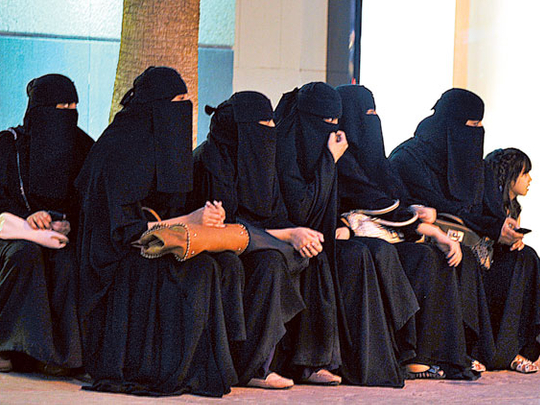
Beirut: King Abdullah Bin Abdul Aziz Al Saud appointed 30 women to the previously all-male 150 members Majlis Shura (Consultative Council), which marked a historic first as the reform-driven Saudi monarch pushed for a fundamental transformation of the conservative kingdom.
Critics wondered whether this latest measure, which gives women a 20 per cent quota in the largely advisory council, was a symbolic gesture whose goal was to boost morale. As evidence, commentators referred to the many stipulations that perpetuated segregation inside the council, with a special area designated for females who would enter through a separate door so as not to mix with their male colleagues.
Presumably, female members would be veiled, and it remained to be determined what types of freedoms they might enjoy to question official policy or whether they would be granted the liberty to participate in various debates.
Be that as it may, King Abdullah was determined to grant women more political rights, based on the recommendations of the June 2004 “National Dialogue on Women” meeting, as well as his September 2011 pledge to grant women the right to cast ballots and run as candidates in the next municipal election, now set for 2015.
Importantly, while leading clerics objected that they were not consulted on the ruler’s key social policies, the Saudi Press Agency reported that the Saudi sovereign took his latest decision following consultations with senior ‘Ulemah.’ Whether the clerical establishment would now obey their monarch’s orders were difficult to ascertain, though Riyadh was not unfamiliar with the kinds of hurdles that any Saudi king confronted.
Indeed, women’s rights were still considered to be a sensitive matter in the kingdom, as conservative doctors of law applied narrow Shariah interpretations. Any changes at this level provoked impassioned opposition from most clerics as women were subjected to specific restrictions.
Still, King Abdullah pursued his reforms, and though he frequently dismissed conservative clerics who displayed audacity by openly criticising him, what truly interested the king was the long-term continuum.
Towards that end, he concentrated on the need to emphasise a woman’s role within the family without neglecting the right to work and earn decent wages, objectives that were fully compatible with Shariah; to ensure that guardianship ties between men and women be based on piety and consultation rather than control; as well as secure legal protections for women that protected them from predatory practices no matter where such deviancies originated.
This quest for a continuum, which was an aspect of the monarch’s “will to power,” illustrated that the king wished to introduce lasting changes rather than simply tapping his magic baton and to impose the kind of reforms he favoured.
Naturally, mixed-gender environments faced significant opposition, though effective reforms were those that were steady and gradual, rather than the ones that aimed to alter narrow views.
The gradualist ruler was likely to adopt similar measures to help eliminate such restrictions as the existing driving ban on women, or the right to travel without the consent of a male guardian.
Even more radical reforms were probably under study, including a 2008 proposal to invite women to join the Hayat Kibar Al Ulemah (Board of Senior Ulemah).
In fact, and although a start date was not announced, Riyadh recently secured the consent of the clergy for female attorneys to litigate family cases in court. In time, and while leading members of the Board of Senior Ulemah rejected the idea of female justices joining the seventeen appointed scholars, King Abdullah or his successor were likely to appoint a woman to the contemplated Supreme Judicial Council.
When the Custodian of the Two Holy Mosques first announced his intentions to appoint women to the Shura Council in December 2011, no one expected that the monarch would move this fast, not least the Grand Mufti of the Kingdom Shaikh Abdul Aziz Al Shaikh and other clerics sitting nearby.
“It is our right to seek your opinions and advice,” underscored the ruler, warning “those who keep away from these guidelines,” as being nothing more than “arrogant persons” who would “have to bear the responsibility of their actions.”
The king rejected efforts to “marginalise the role of women in Saudi society,” but opted to work within his culture’s established norms though everyone understood the inevitable consequence of his initiatives.
Because Saudi Arabia remained the only country in the world that imposed strict guardianship conditions and prohibited women from driving and exercising various personal freedoms, many believed that the time was long overdue to let women exercise basic freedoms.
The most recent appointment of 30 women to the Majlis Shura ensured that King Abdullah’s gender-related reforms intended to give the majority of Saudi women the chance to assume their full responsibilities and, in the process, to allow the kingdom to transform itself into a world-class economic power.













